The Best Travel Credit Cards of 2026
A life of travel often comes with many expenses, but there are some great ways to reduce them. One notable way is through the use of a credit card that offers discounted flights and hotel stays.
With an upgraded personal concierge service, access to extra benefits like upgrades and discounts for restaurants or attractions in your destination city; you may find yourself saving more than just money on airfare!
These rewards don’t just help you save money on travel. They can help you have the best possible travel experience.
The first step is choosing the travel rewards credit cards that will pay you for the spending that’s going to happen anyway.
Travel reward programs are great for anyone who travels often or loves planning trips – with these special perks that you earn by opening credit cards or simply shopping at certain stores, every trip becomes more affordable!
We keep a close eye on the most popular credit cards and analyzed 50+ offerings to choose the top travel credit cards out there right now:
The Best Travel Credit Cards of 2025
| Credit Card | Best For | MyBankTracker Rating (1 to 5 stars) |
|---|---|---|
| Chase Sapphire Preferred Card | Best for Transferring Rewards | 5.0 |
| The Platinum Card® from American Express | Best for Premium Travel Benefits | 5.0 |
| Capital One Venture Rewards Card | Best for Miles Rewards Program | 4.5 |
| Chase Sapphire Reserve Card | Best for High Points Redemption Values | 5.0 |
| Capital One VentureOne Rewards Card | Best for No Annual Fee | 4.0 |
| American Express® Gold Card | Best for Restaurants & Dining | 3.0 |
| Southwest Rapid Rewards Premier Credit Card | Best for Free Companion Travel | 3.0 |
| Hilton Honors American Express Card | Best Hotel Credit Card for Everyday Purchases | 3.0 |
| Marriott Bonvoy Boundless Card | Best Hotel Card for Free Night Rewards | 5.0 |
| Chase Ink Business Preferred Credit Card | Best for Business Travel Insurance | 4.0 |
| The Business Platinum Card® from American Express | Best for First-Class & Business Travel | 4.0 |
Chase Sapphire Preferred: Best for Points Transfers
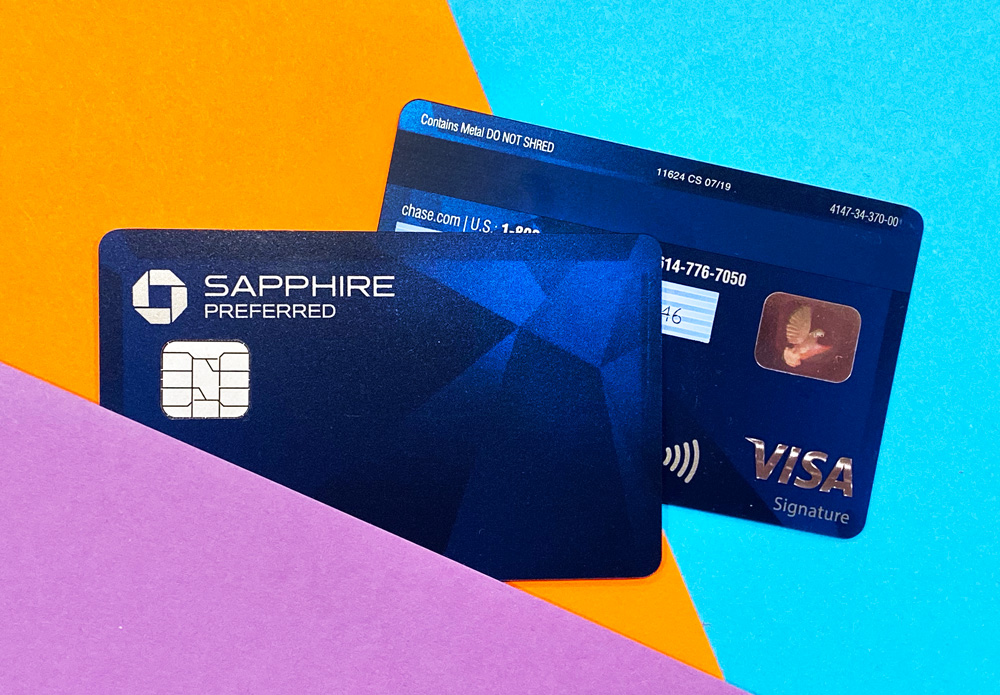
Chase Sapphire Preferred Card Pros & Cons
| Pros | Cons |
|---|---|
|
|
If you’re looking for a premium travel rewards credit card, Chase Sapphire Preferred is the option, offering a highly flexible rewards program.
For example, you can transfer your points to travel partner airline and hotel loyalty programs.
To get this card, you do have to pay an annual fee. As long as you earn more in rewards than you spend on the annual fee, then this annual fee can be well worth it.
Read the Chase Sapphire Preferred Card editor’s review.
The Platinum Card® from American Express: Best for Premium Travel Benefits
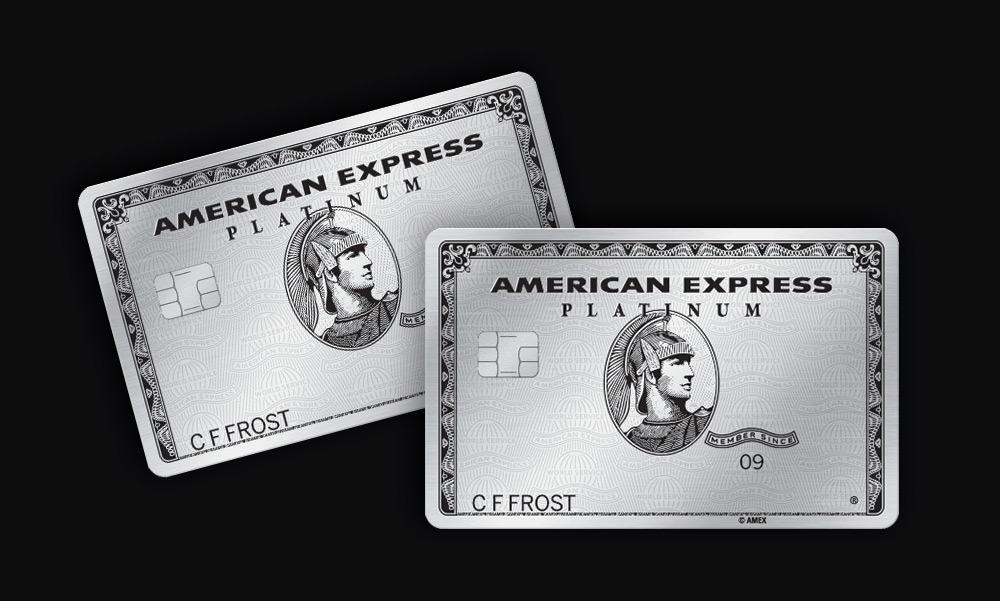
*See Rates & Fees. Terms apply.
The Platinum Card from American Express Card Pros & Cons
| Pros | Cons |
|---|---|
|
|
If you want a luxury travel experience, the Platinum Card is the card for you. Though it carries a hefty $695 annual fee (see Rates & Fees; terms apply), it more than makes up for it with perks.
First, cardholders can skip the line at security with a $100 credit they can use to sign up for TSA Precheck or Global Entry. Once you’re through security, cardholders get free entry to more than 1,300 airport lounges around the world.
You’ll also enjoy perks like complimentary hotel status, hotel room upgrades, hotel credit, airline fee credits, and credits you can use for Uber.
The rewards are also worth mentioning as you’ll earn plenty of points on travel. You can redeem those points for future trips through American Express or transfer them to a long list of other travel loyalty programs.
Read the editor’s full review of The Platinum Card from American Express.
Capital One Venture X Rewards Credit Card: Best for Premium Travel Rewards
Capital One Venture X Rewards Card Pros & Cons
| Pros | Cons |
|---|---|
|
|
The Capital One Venture X Rewards Credit Card is a premium travel rewards credit card offering amazing value despite its $395 annual fee.
The card provides a $300 annual travel credit for bookings through Capital One Travel, the issuer’s travel-booking portal. The card also offers partial refunds for such bookings that may experience a price drop within 24 hours after booking a flight or hotel stay.
Other useful travel perks include complimentary access to Capital One Lounges (2 free guests per visit; $45 per additional guest), Priority Pass membership, credit for Global Entry or TSA PreCheck, and no foreign transaction fees.
Capital One Venture Rewards Credit Card: Best for Simple Miles Rewards
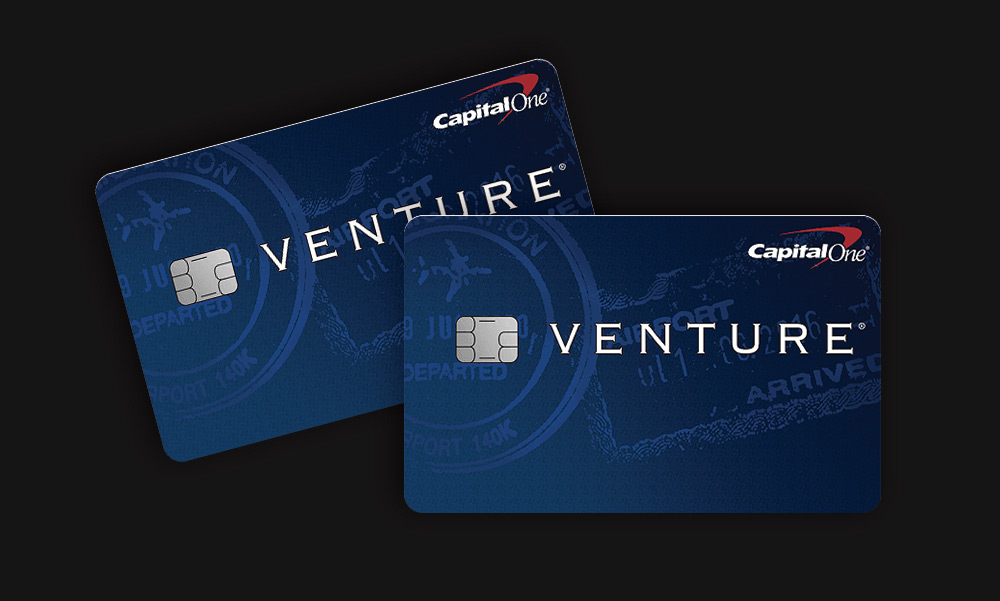
Capital One Venture Rewards Card Pros & Cons
| Pros | Cons |
|---|---|
|
|
The Capital One Venture Rewards Credit Card is great for those how don’t want to deal with travel restrictions or complex rewards programs.
With this card, you can get 2 miles per dollar spent on all purchases. Each mile is worth 1 cent for travel, to be redeemed as a statement credit.
So, book any trip on your own and just use the miles to “erase” the charge(s) on your card.
Miles can be transferred to major airline partners to get more value out of those miles.
Moreover, you’ll receive up to $100 in credit toward Global Entry or TSA Precheck® application fees.
This card has an annual fee and there are no foreign transaction fees — ideal for international travel.
Read Capital One Venture Rewards Credit Card editor’s review.
Chase Sapphire Reserve: Best for High Points-Redemption Values
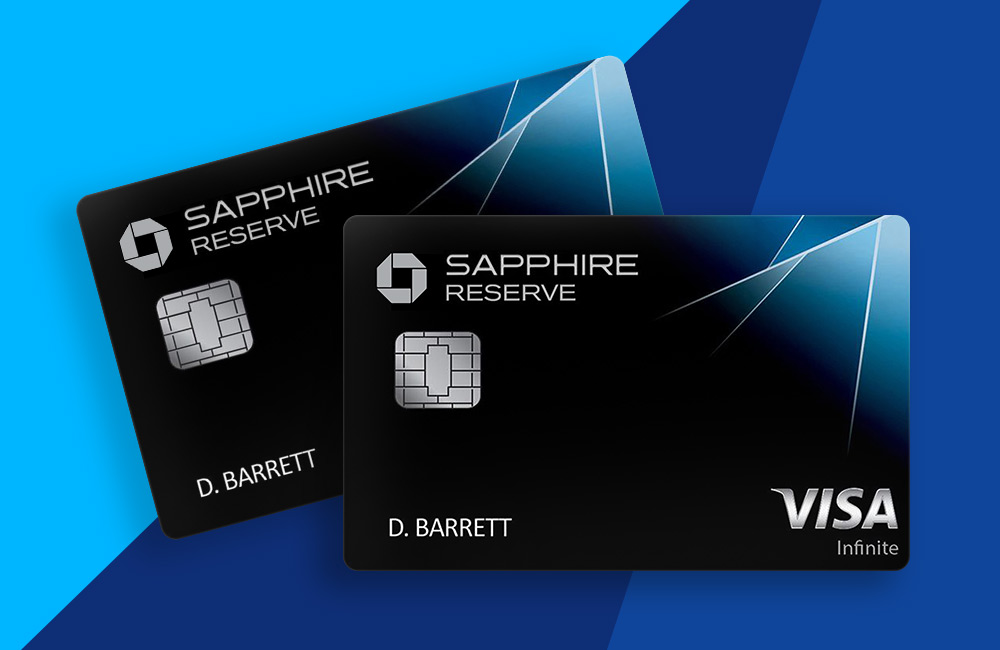
Chase Sapphire Reserve Card Pros & Cons
| Pros | Cons |
|---|---|
|
|
One of the most popular travel rewards cards is the Chase Sapphire Reserve Card[/mbt-wdget].
It offers 5x total points on air travel and 10x total points on hotels and car rentals when you purchase travel through Chase Ultimate Rewards after the first $300 is spent on travel purchases annually. Earn 3x points on other travel and dining & 1 point per $1 spent on all other purchases.
Points can be redeemed for one cent each as cash back or for gift cards. Or points are worth 1.5x towards travel reservations. You can use points to make these reservations online with Chase’s Ultimate Rewards travel portal.
But, what’s great about this card is that you can transfer your points to other frequent traveler programs.
They include major airline frequent flyer programs and hotel programs. This is what travel experts do to end up flying in business class and staying in luxury hotels.
Airline partners include Southwest, United, and British Airways (which is a partner of American), and hotel programs including Hyatt, Marriott, and IHG (Intercontinental, Holiday Inn, and other brands).
When you redeem miles for expensive flights in business class, you get the most value from them.
Benefits include travel insurance and purchase protection policies including primary rental car insurance. This way, if you ever have a rental car that gets damaged, you won’t have to file a claim with your own car insurance first.
Chase Sapphire Reserve has a $550 annual fee for this card and no foreign transaction fees.
Key features to reduce the cost of the annual fee include:
- $300 Annual travel statement credit
- Up to $100 reimbursed for Global Entry or TSA Precheck membership
- Free Priority Pass Select Membership
And if that’s not cool enough, the card is made out of metal which draws a lot of reactions!
Read Chase Sapphire Reserve Card editor’s review.
Capital One VentureOne Rewards Card: Best for No Annual Fee
Capital One VentureOne Rewards Card Pros & Cons
| Pros | Cons |
|---|---|
|
|
For a travel a credit with no annual fee, the Capital One VentureOne Rewards credit card is a great option.
The key standout is the lack of foreign transaction fees, which saves money when using a credit card internationally because you don’t have to pay a 3% fee (roughly) for that convenience.
Read the in-depth Capital One VentureOne Rewards Credit Card editor’s review.
American Express Gold Card: Best for Restaurants & Dining
American Express Gold Card Pros & Cons
| Pros | Cons |
|---|---|
|
|
The Gold Card is American Express’ mid-level rewards card that offers valuable rewards and perks for both everyday use and travel.
You’ll earn 4x points on dining and U.S. supermarkets (on up to $25,000 in purchases in this category per year) and 3x points flights when booked directly with airlines or amextravel.com. The card has no foreign transaction fees, so you can use it wherever you travel and keep earning rewards toward your next vacation.
Once you earn rewards, you can redeem them for flights and hotels directly through the American Express website. You also have the option of transferring your points to American Express’ airline and hotel partners.
Cardholders get some other valuable benefits, including $120 in Uber credits each year, which can save you money on food delivery and transportation. You also get credits toward select restaurants. Members who stay at select hotels will also receive a $100 credit they can use toward things like dining and spa visits.
If you travel a lot, you can easily make up the $250 annual fee (see Rates & Fees; terms apply).
Southwest Rapid Rewards Premier Credit Card: Best for Free Companion Travel
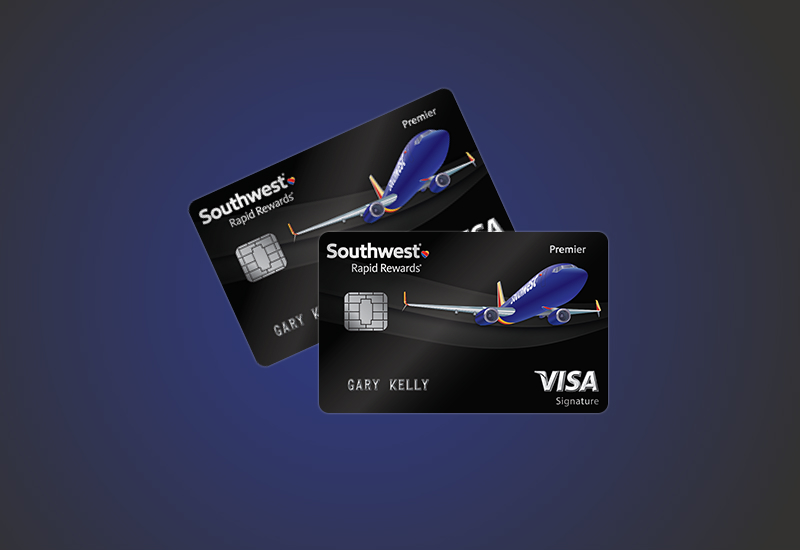
Southwest Rapid Rewards Premier Credit Card Pros & Cons
| Pros | Cons |
|---|---|
|
|
The Southwest Rapid Rewards Premier card is a fantastic choice for people who want to travel frequently within the U.S. The card’s signup bonus, which can vary, is typically enough to purchase at least a roundtrip flight, if not multiple trips.
Cardholders will receive 2 points for every dollar spent on Southwest and 1 point per dollar spent elsewhere. Additionally, you’ll get 6,000 points on your cardholder anniversary each year.
If you own a business, you can also sign up for a Southwest business card. Between the two signup bonuses, you’ll be close to earning the Southwest Companion Pass, which gets you a pass that gives a named companion a free ticket each time you book a flight for yourself.
Read the full Southwest Rapid Rewards Premier Credit Card editor’s review.
Hilton Honors American Express Card: Best Hotel Credit Card
*See Rates & Fees. Terms apply.
Hilton Honors Card from American Express Card Pros & Cons
| Pros | Cons |
|---|---|
|
|
If you’re a Hilton fan, the Hilton Honors American Express is well-worth getting. It has no annual fee and offers a variety of perks.
You’ll earn a lot of Hilton points when you use the card: 7 per dollar on Hilton purchases, 5 per dollar on dining, groceries, and gas, and 3 per dollar spent everywhere else.
Cardholders also get complimentary Hilton Silver status, which confers benefits such as getting your fifth night free on each stay and 20% bonus points with every stay.
Read the Hilton Honors American Express Card editor’s review.
Marriott Bonvoy Boundless Card: Best Hotel Card for Free Night Rewards
Marriott Bonvoy Boundless Credit Card Pros & Cons
| Pros | Cons |
|---|---|
|
|
If you prefer Marriott to Hilton, the Marriott Bonvoy Boundless card gets you great perks at Marriott hotels.
For a $95 annual fee, you’ll earn 6 points per dollar spent at Marriott hotels, 2 points per dollar spent anywhere else. On their card anniversary date, cardholders also get a certificate for a free night, up to a 35,000 point value, at any Marriott hotel.
You’ll also get complimentary Silver Elite status and fifteen night credits toward earning Gold Elite status, which comes with perks like free room upgrades and bonus points with each stay. This is a significant perk if you want to earn higher status or even lifetime status.
Read the Marriott Bonvoy Boundless Credit Card editor’s review.
Chase Ink Business Preferred Credit Card: Best for Business Travel Protections
Chase Ink Business Preferred Card Pros & Cons
| Pros | Cons |
|---|---|
|
|
This card is the best for business travel insurance because it comes with a variety of benefits that help cut down on expenses, especially when things don’t go as planned.
For example, this card offers an emergency medical benefit to cover accidental injuries or illnesses while traveling in over 150 countries and territories worldwide – so you don’t have to worry about any accidents when abroad.
Other great features include protection from lost baggage (up to $2,500), delayed flights/deliveries ($100 per day up-to a maximum amount of $5,000) and much more!
This Chase Ink Business Preferred Credit Card will keep your travels safe no matter where they take you thanks to its wide range of coverage options such as travel assistance services like roadside dispatch service which sends out someone within two hours.
Read the Chase Ink Business Preferred Credit Card editor’s review.
The Business Platinum Card® from American Express: Best for Business Travel Perks
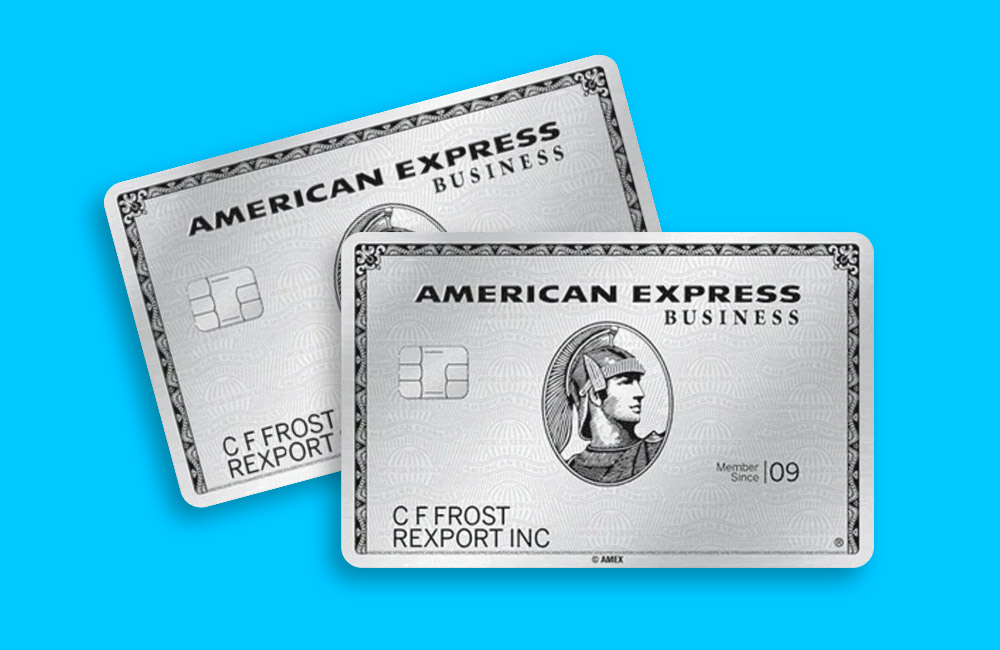
See Rates & Fees. Terms apply.
American Express Business Platinum Card Pros & Cons
| Pros | Cons |
|---|---|
|
|
See Rates & Fees. Terms apply.
The Business Platinum Card® from American Express is the best card for first-class and business travelers.
The benefits of this credit card are unbeatable, giving you unparalleled flexibility to pursue your career while traveling on a luxurious plane with complimentary food and drinks anytime.
The Business Platinum Credit Card by Amex provides all of its members with unmatched trips in either coach or luxury travel classes because it has so many perks that can’t be matched anywhere else!
Read the full editor’s review for The Business Platinum Card from American Express.
How We Picked
Every credit card is designed for a specific type of consumer. And, no one credit card is the perfect match for every traveler.
We analyzed more than 30 credit cards that are designed for travel and compared their card fees, rewards, travel benefits and how the card is best for earning award travel accommodations. That said, while some of the cards are from advertisers on MyBankTracker, they are truly the best cards that we’d recommend even if they weren’t affiliated partners.
How to Turn Credit Card Rewards Into Free Travel
Different travel credit cards offer different kinds of rewards programs.
Some create partnerships with travel brands, including airlines and hotels. These partnerships enable you to transfer points your points to eligible travel loyalty programs.
What does that mean for you? Freedom to redeem your points through various travel programs – all from one card.
There’s one caveat: before you redeem, make sure those partners offer the best deals.
It’s always worth shopping around. The loyalty program you prefer may not always have the best deal. Timing can play a big part in your options.
Also, the points-transfer rate may vary among the credit card’s rewards partners. That means it is possible that your transferred points will lose value if you transfer. In these cases, the points are better off redeemed for something of greater value.
Statements Credits for Simpler Travel Rewards
Rewards programs can vary from card to card. For example, many airline credit cards only give free flights to their airline.
Similarly, other credit cards might only provide travel rewards from partnered brands. That’s why it matters so much which card you choose. Some of the best out there allow you to redeem rewards for statement credits or rewards that work with any travel providers.
A statement credit is more or less like a refund (or partial refund) on your credit card balance. The end result is that your balance is reduced with the help of your rewards.
However, your card may require your credit to be applied only to a certain type of purchase, such as travel.
Travel Rewards Credit Cards Tend to Have Big Sign-Up Bonuses
As if you couldn’t already earn a lot of rewards through travel credit cards, some even offer sign-up bonuses. These bonuses can amount to massive amounts of extra travel points and miles.
It’s not uncommon for there to be a required amount of minimum spending to qualify. Typically, those purchases have to happen in the first few months of opening the card.
Therefore, if you’re planning on making any large purchases, hold off. If you can make that purchase with your new travel rewards card, you can boost your rewards.
Travel Rewards Credit Cards Also Have Many Travel Perks
There’s a long list of travel benefits that can come with a travel rewards credit card. Not only can these benefits create a more enjoyable experience, they can also help save you time and money.
Just some of the perks you might get:
- Personal concierge
- Car rental insurance (primary coverage)
- No foreign transaction fees
- Complimentary travel upgrades and amenities
Personal concierge service is like having a personal assistant. Many credit cards provide this as a complimentary benefit to their customers.
Concierge agents can look up travel requests, book restaurant reservations, locate shopping items, and more. Depending on the difficulty of the request, agents may need a few days to respond.
It’s important to note that concierge agents will not use your credit card information to make purchases. They simply provide you the information you need and you do the rest.
Another perk to look for in a travel credit card is the lack of foreign transaction fees. Whenever you make a purchase internationally, you’re subject to a fee of up to 3%. That’s called a foreign transaction fee. And it can add up surprisingly fast.
How to Make the Most of Your Travel Rewards
1. Earn more with higher-tiered frequent flyer status
To start earning bonuses, you have to earn a higher status as a frequent flyer.
Typically, that means you have to fly a certain number miles with one carrier in a given period. Reaching a higher mile tier could enable you to score perks and first class upgrades. Higher reward rates may also be available, depending on the program.
To make the most of your travel, pick one airline carrier and stick with them to build status.
If you’re planning on booking a number of international flights, check out which airlines partner with the carrier you choose.
2. Combin hotel and car rental and other loyalty points
If you want to get serious about racking up frequent flyer miles, take a look at your options and develop a strategy.
Many hotels and car rental companies offer programs that allow you to earn free nights. Lower your travel expenses even more by getting into these programs.
Then stick with as few hotel networks to maximize bonuses and offers as possible. That way you can build them up in one place instead of scattering the points among several.
3. Save more by finding the lowest cost-per-mile flights
The trick to booking mileage runs is to find the lowest cost-per-mile flights.
The most dedicated mileage junkies will take long flights from the airport to the airport over a period of several days.
Sometimes, these trips involve short layovers so that the flyer can rack up as many miles over several days as possible. If spending a lot of time in airports doesn’t appeal to you, this may not be a good idea.
Others frequent flyers will use a long, discounted flight to take a short visit to a distant place. For example, it could be a trip to Alaska for East Coasters or an island in the Caribbean for West Coasters. This way, travelers get to enjoy a destination (even if briefly) on top of earning additional miles.
4. Book flights with layovers
When taking regular trips, booking the longest trip possible is the way to go. Gone are the days of non-stop flights for most mileage junkies.
This is usually only possible for long, international routes. If you have some patience and know how to keep yourself entertained, you can earn a lot of additional miles by taking an out of the way route to and from your destination.
Of course, this kind of journey is only for those who don’t mind sitting in the same seat for a very long time. These flights can be more than 20 total hours in duration.
5. Don’t forget to jump on bonus times
While it’s hard to predict if airline carriers will continue to do so, some carriers have been known to offer double miles on certain flights to help fill seats.
Many mileage junkies will book these flights to get the most miles for their ticketing dollars, regardless of the destination.
As soon as you know of your travel plans, look around for bonus times like these to see if they can help you quickly increase your miles for that dream trip.
The Credit Scores Needed for a Travel Credit Card
Travel credit cards can offer a long list of benefits. And when a credit card offers more rewards and perks, it tends to require a better credit score of its cardholders.
For a premium travel rewards credit card (usually those with high annual fees), credit card issuers will likely require good to excellent credit for approval.
So, if you’re credit isn’t at this level, you may not be able to obtain a top-tier travel credit card. Or, if you do get approved, the interest rate will be on the higher end of the APR range.
When it comes to credit scores, the one most commonly used by more than 90% of major U.S. lenders is the FICO score. Its exact formula is top-secret that is based on the data in your personal credit reports but there are 5 major factors that go into the calculation, which we do know:

For the best chances of qualifying for travel rewards credit card, you should have a FICO score of at least 700.
Ways to Improve Your Credit
If your credit score is not in the optimal range to get approved for a travel card, there are ways that you can improve your credit in a relatively short period of time.
Pay down debt
This is an obvious method of increasing your credit score. When you reduce the balances on your loans and credit lines, your ” credit utilization” ratio decreases and it makes you look like you’re borrowing less than what you’re capable of borrowing. (The ratio is calculated by the total debt divided total combined credit limits.)
Dispute any credit report errors
Any inaccurate information on your credit reports can hurt your credit score.
Therefore, it is best to have any errors removed from your file, especially credit lines that don’t belong to you.
Increase credit limits
This tactic goes back to the debt-utilization ratio. When you raise your credit limits, you’ll appear to be using less of your borrowing potential — that is, you’re not desperately living through credit.
With your existing credit cards and lines of credit, you may request an increase in your limits.
Once you’ve made these changes, you should wait at least 30 days before you apply for a travel credit card because that usually how long it will take for your credit report to be updated.
See the rates & fees for the mentioned American Express cards: The Platinum Card from American Express (Rates & Fees; terms apply), American Express Gold Card (Rates & Fees; terms apply), Hilton Honors Card from American Express (Rates & Fees; terms apply) and The Business Platinum Card from American Express (Rates & Fees; terms apply).

